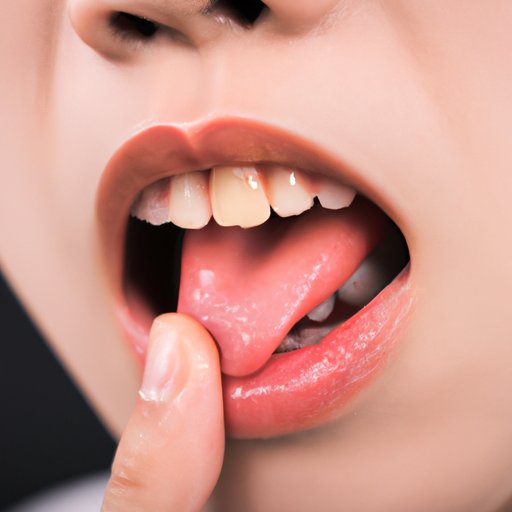
Introduction
If you’ve ever experienced a cold sore, you know how uncomfortable and unsightly they can be. Cold sores are a common viral infection caused by the herpes simplex virus (HSV). They typically occur on or around the lips, but did you know that they can also appear on the tongue?
In this article, we’ll explore the causes and treatment options for cold sores on the tongue. Whether you’re experiencing symptoms or just curious, we hope this guide will provide helpful information and tips.
Can Cold Sores Really Occur on Your Tongue?
The short answer is yes, cold sores can develop on the tongue. According to medical research, HSV-1 and HSV-2 (the two types of herpes viruses that cause cold sores) can infect any part of the body.
When HSV enters the body, it travels through the nervous system and can remain dormant for long periods of time. Stress, illness, and environmental factors can aggravate the virus and cause outbreaks, which typically result in blisters or sores on the affected area.
So how exactly can cold sores appear on the tongue? The virus can infect the tongue through direct contact with an infected area, such as the lips or mouth. It can also be spread through a shared contaminated object, like a toothbrush or eating utensil.
Home Remedies, Preventative Measures, and Treatment Options
While there isn’t a cure for HSV, there are ways to manage cold sores on the tongue. Some home remedies that may help alleviate symptoms include:
- Applying a cold compress to the affected area for 10-15 minutes at a time
- Rinsing the mouth with salt water to soothe irritation
- Avoiding spicy or acidic foods that may aggravate the sore
- Using over-the-counter numbing agents or antiviral creams as directed
Preventative measures can also be taken to avoid outbreaks and reduce the severity of symptoms. Some tips include:
- Maintaining good oral hygiene, including regular brushing and flossing
- Avoiding sharing personal items like toothbrushes and razors
- Practicing stress-reducing activities, like meditation or exercise
In severe cases, medical treatment may be necessary. Antiviral medications can be prescribed by a doctor to help reduce the length and severity of outbreaks.
Potential Causes of Cold Sores on the Tongue
There are several factors that can increase the likelihood of cold sores developing on the tongue. Some of these include:
- Weakened immune system
- Excessive sun exposure
- Hormonal changes
- Smoking or tobacco use
- Chemotherapy or radiation therapy
If you are experiencing frequent outbreaks or are concerned about potential causes, it’s important to speak with a healthcare provider or dentist. They may be able to provide more targeted treatment options or referrals to specialists.
Anecdotal Examples of People with Cold Sores on the Tongue
Personal accounts of those experiencing cold sores on the tongue can be helpful in understanding the symptoms, treatment options, and coping mechanisms. Some individuals have reported:
- Painful sores or blisters on the tongue and surrounding areas
- Difficulty eating and drinking
- Embarrassment or self-consciousness about the appearance of the sore
- Relief from home remedies, including tea tree oil and aloe vera
It’s important to note that everyone’s experience with cold sores on the tongue will be different. If you’re experiencing symptoms, don’t hesitate to speak with a healthcare provider or dentist for personalized advice.
Frequently Asked Questions
Here are some common FAQs and answers about cold sores on the tongue:
What are the symptoms of a cold sore on the tongue?
Symptoms may include painful blisters or sores on the tongue or surrounding areas, difficulty eating and drinking, and potential chills or fever if the outbreak is particularly severe.
How can I prevent cold sores on the tongue?
Avoid sharing personal items like toothbrushes and razors, and practice good oral hygiene habits, like regular brushing and flossing. Additionally, stress-reducing activities like meditation and exercise may help reduce the likelihood of outbreaks.
Are cold sores on the tongue contagious?
Yes, cold sores on the tongue can be contagious. The virus can be spread through direct contact with an infected area or a shared contaminated object.
Conclusion
Cold sores on the tongue can be uncomfortable and unsightly, but there are ways to manage the symptoms and reduce the likelihood of outbreaks. By practicing good oral hygiene, using preventative measures, and speaking with a healthcare provider if needed, individuals can take control of their cold sore outbreaks and find relief.





